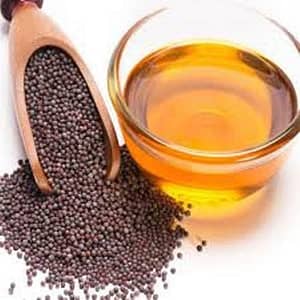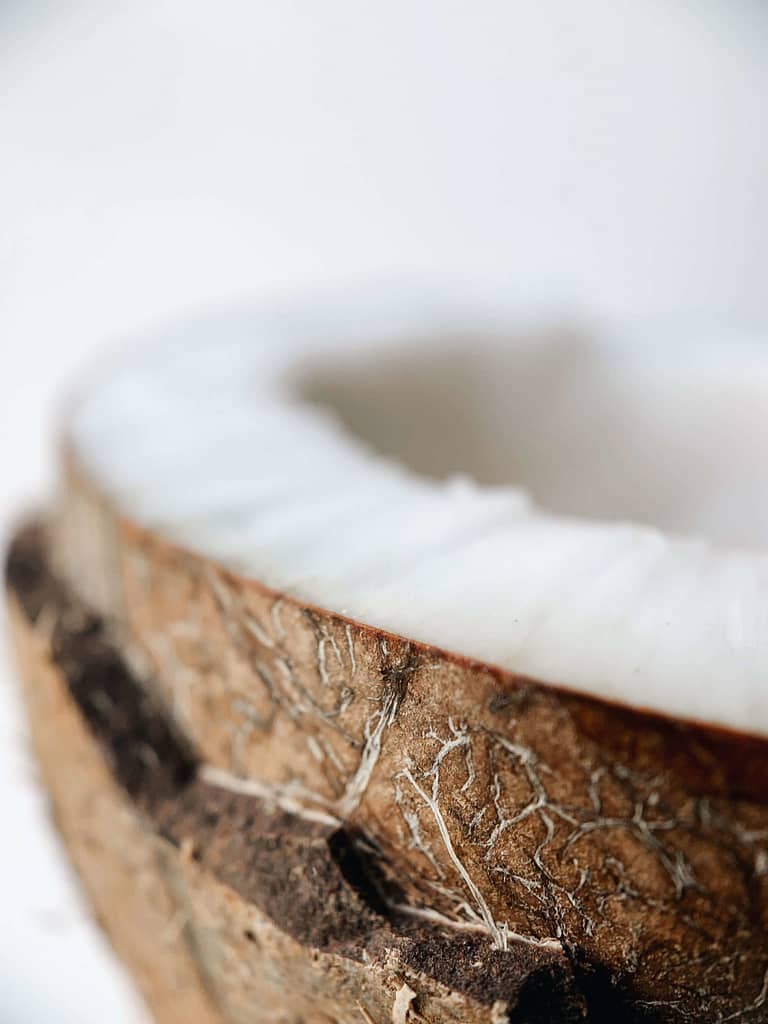Mustard oil and coconut oil for hair? Absolutely! These two super nourishing oils have numerous benefits that far supersede their culinary usage.
Feminine grooming is rather hard when compared to that of our male counterparts, but does it have to be harder? I think not. Why resort to a plethora of hair creams, hair gels, conditioners, lustre sprays, setting sprays, frizz control serums and whatnot when you can borrow some good old desi oils from your mom?
And yes, they work wonders on your hair. While coconut oil is light, provides great moisturization and prevents the loss of natural protein, mustard oil can be used as a deep conditioning hair mask due to its warming qualities.
Many men and women are embracing the natural benefits of using oils on their hair. But using the wrong oil can further aggravate existing issues such as greasiness, dandruff or even hair fall. It is important to find the right oil for your scalp so that you can flaunt your tresses without a worry.

Which Oil Is Right For Me?
Hair oils are often advertised as one-fit-for-all products. But they seldom are. Mass production companies add a lot more into oil than just the natural derivatives. There are preservatives, fragrances, other essential oils, blends and more. For the most part, these products are meant for general use and don’t always target particular hair issues. To choose the right oil for yourself, it is immensely important to know what the oil really does and what benefits you can avail for yourself when you use it.
The Benefits Of Mustard Oil For Hair
Mustard oil, also known as Sarson ka tel is primarily used in kitchens to flavour dishes. While it is easily available, it is often overlooked as a product for hair care regimens.
It is super rich in natural fats making it a go-to remedy for emergency hair taming sessions. It brings out the shine in the hair and treats dryness, heat damage, flaky scalp, frizz, split ends and breakage.
1. Mustard oil for inflammatory scalp conditions:
Studies show that a compound in mustard oil, the allyl isothiocyanate has anti-inflammatory potential as well. This, along with other anti-inflammatory properties in mustard oil, allows for soothing scalp treatments in cases of dermatitis, eczema, psoriasis and folliculitis.
2. Antibacterial And Antifungal Properties:
Research shows that mustard oil has antibacterial and antifungal properties. These properties make it a viable remedy to treat fungal induced dandruff and acne or pimples on the scalp.
3. It is chock full of minerals, antioxidants and vitamins:
Mustard oil is packed with antioxidants, iron, calcium, magnesium, and vitamins such as A, D, E and K. It also has zinc, betacarotene and selenium. All of these constituents boost hair growth and keep hair healthy and shiny.
4. Great For Premature Grey Hair
Mustard oil is also a good remedy for darkening premature grey hair. It is rich in selenium and antioxidants, and regular usage increases melanin production giving natural black colour to hair.
How To Use Mustard Oil?
Mustard oil can be used as a stand-alone hair mask by massaging into the scalp and leaving it for 30-40 minutes before hair wash. It can also be used as a sped-up hair care treatment by wrapping a warm towel after application and rinsing it after fifteen minutes. Right before use, it can be warmed for a few minutes to loosen the viscosity and for better absorption into the scalp.
Here are a few variations of mustard oil hair masks:
1. Mustard oil in combination with aloe vera
Mustard oil and aloe vera gel can be mixed into a loose paste and applied on the scalp. This mixture is left on the scalp for the duration of 30-40 minutes and rinsed off with a mild shampoo. This hair mask deeply nourishes hair and protects it from damage.
2. Mustard oil in combination with Lemon juice:
Mustard oil, fenugreek powder and lemon juice are mixed well and applied to the scalp. This mask is left for 30 minutes before a mild shampoo rinse. These ingredients help strengthen hair while ridding it of dandruff.
3. Mustard oil in combination with Yoghurt:
Mustard oil and yoghurt can be mixed into a bowl and set aside. In the meantime, a hot towel can be prepared by dipping a towel into hot water and wringing it dry.
Wring the towel after the application of the hair mask and wrap it around the hair. Leave for about 30 minutes and rinse off with a mild shampoo. This hair mask leaves the hair soft, nourished and shiny.
Read Article: Mustard Oil vs. Almond Oil for Hair: Which One Is Better?
The Benefits Of Coconut Oil For Hair
The world has embraced coconut oil for its applications outside the culinary world. It is a great balm, it can be used as a base for natural makeup and can even be used to treat dry skin on the arms and legs during winters. It has also been used to treat eczema in children.

1. Prevents Hair Protein Loss:
A study that compares coconut oil with sunflower oil and mineral oil shows that it can protect the hair from protein loss be it undamaged hair, chemically treated hair, UV exposed hair and even bleached hair. Sunflower oil and mineral oil didn’t show any such results.
2. It gets easily absorbed into the scalp and strands:
We can owe it to coconut oil’s fatty acid chain for its capacity to be easily absorbed into our hair shafts. It has a long and straight chemical structure that deeply penetrates the hair shaft, thus, ensuring its moisturising effects.
3. It is very versatile:
Coconut oil can be used in place of a serum, as a hair mask, in place of frizz taming sprays and heavy-bodied creams. It can easily be combined with other products and can also be used as a base oil for infusion of onion to help boost its benefits.
How To Use Coconut Oil?
Coconut oil can be used in massage therapies, in hair mask combinations and also as a stand-alone nourishing agent. It can be warmed before hair massage or even infused with other ingredients or oils. You can read a detailed article about coconut oil uses and questions here.
Here are a few coconut oil hair masks to help keep your hair shiny and smooth:
1. Coconut oil in combination with Aloe Vera
Coconut oil can be mixed into aloe vera gel and applied from the scalp and roots through to the ends. It can be left for 30 -40 minutes and followed with a mild shampoo rinse. This hair mask is great for nourished and soft tresses.
2. Coconut oil in combination with honey
Warm equal parts of coconut oil and honey in a bowl and mix well. Apply generously over the hair and leave for 40 minutes. Wash off with a mild shampoo.
3. Coconut oil in combination with egg
Take two tablespoons of coconut oil and mix it into one whisked egg. Apply this mixture over hair and let sit for 15-20 minutes. Rinse well with a mild shampoo.
Read Article: Nalangu Maavu – Ayurvedic Herbal Bath Powder For Beautiful Skin
FAQ – Frequently Asked Questions
Can we mix the coconut oil and mustard oil for hair?
Yes, they can be combined and mixed. Equal parts of coconut oil and mustard oil can be mixed and used to loosen up the oil and to use it regularly.
Can we use cooking mustard oil for hair?
Yes, cooking mustard oil is essentially the same thing. But make sure it is pure mustard oil without adulteration. In India, the kacchi Ghani mustard oil is considered good for cooking as well as applying on the hair as it is extracted by the cold pressing process and retains all its nutritional value.
Can I make hair masks?
Yes. Hair masks can be made using both oils. Ensure that the mask or oils are not applied in excess as they may clog pores.
Which oil is better for hair growth?
Both oils are great to promote hair growth. Mustard oil can be used from time to time and coconut oil can be used on a regular basis as it is easily absorbed and does not have a pungent smell. Mustard oil can be used in hair masks or weekend hair therapy or massage sessions.
Are there any side effects?
Coconut oil does not have any side effects. Mustard oil may give a pungent smell, cause eye irritation and clog pores if applied in excess.
Suitability, Safety And Precautions
As for the safety profile, both oils have been used extensively in Asia for their flavour profile. Should there be any existing health issues, it is recommended that you consult your medical practitioner before actively using both products.
It is also recommended that a patch test be conducted on the skin before a thorough application to the scalp and hair.
The side effects are restricted to mustard oil and are not severe. Clogged pores, when applied to the skin, are normal. There is also a pungent smell and mild eye irritation on excess application. Avoid contact with eyes.
Did you find this post useful? Would you like to get back to it later? Save THIS PIN below to your Pinterest Natural Living or Hair Care board!


how to smoke cbd isolate with a glass pipe
A great way of representation and good information thanks alot 😊
Love your contents❤️
Greetings! I am starting something new in Ayurveda and need synergies of friends like you all around me. Would highly appreciate if we could share our passion.🙏
Hi Anu,
I would be glad to help if you need any! Cheers!
Regards,
Swati